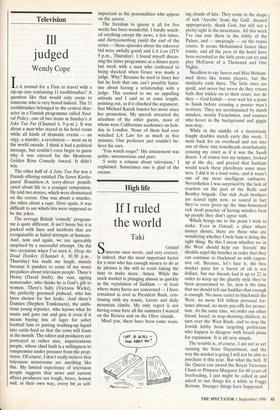Television
Ill
judged
Wendy Cope
Is it normal for a Finn to travel with a zip-up case containing 11 toothbrushes? A question like that would only occur to someone who is very bored indeed. The 11 toothbrushes belonged to the central char- acter in a Finnish programme called Neut- ral Policy, one of two items in Sunday's A Joke Too Far (Channel 4, 9 p.m.). It was about a man who stayed in his hotel room while all kinds of dramatic events — an orgy, a murder, a revolution — went on in the world outside. I think it had a political message, but couldn't even begin to guess why it was entered for the Montreux Golden Rose Comedy Award. It didn't win.
The other half of A Joke Too Far was a Danish offering entitled The Soren Kierke- gaard Roadshow. A lorry-driver pontifi- cated about life to a younger companion. He told two stories, which were dramatised on the screen. One was about a murder, the other about a rape. Here again, it was difficult to see which bits were supposed to be the jokes.
The average British 'comedy' program- me is quite different. It isn't funny but it is packed with lines and incidents that are recognisable as failed attempts at humour. And, now and again, we are agreeably surprised by a successful attempt. On the two occasions when I've seen it, Drop the Dead Donkey (Channel 4, 10.30 p.m., Thursday) has made me laugh, mainly because it panders to some of my worst prejudices about television people. There's Henry (David Swift), the vain, ageing newsreader, who thinks he is God's gift to women. There's Sally (Victoria Wicks), the perfectly groomed pinhead, who has
been chosen for her looks. And there's Damien (Stephen Tomkinson), the ambi- tious young reporter, who knows what he wants and goes out and gets it even if it means buying tins of lager for sober football fans or putting washing-up liquid into cattle-feed so that the cows will foam at the mouth. The editor and producers are portrayed as rather nice, unpretentious people, whose chief fault is a willingness to compromise under pressure from the prop- rietor. Of course, I don't really believe that television newsrooms are anything like this. My limited experience of television people suggests that news and current affairs producers are tough, brave, honest and, in their own way, every bit .as self- important as the personalities who appear on the screen.
The freedom to ignore it all for five weeks has been wonderful. I hardly watch- ed anything except the news, a few times, and thirtysomething (until the end of the series — those episodes about the takeover bid were awfully good) and LA Law (ITV 9 p.m., Thursday). I found myself discus- sing the latter programme at a dinner party last week with a man who confessed to being shocked when Grace was made a judge. Why? Because he used to fancy her but he feels that one can't possibly fanta- sise about having a relationship with a judge. This seemed to me an appalling attitude and I said so at some length, pointing out, as if it clinched the argument, that Michael Kuzak fancies her more since her promotion. My speech attracted the attention of the other guests, most of whom were Californian academics on holi- day in London. None of them had ever watched LA Law for as much as five minutes. One professor just couldn't be- lieve his ears.
`You watch soaps?' His amazement was polite, uncensorious and pure.
`I write a column about television,' I explained. Sometimes one is glad of the excuse.


















































 Previous page
Previous page